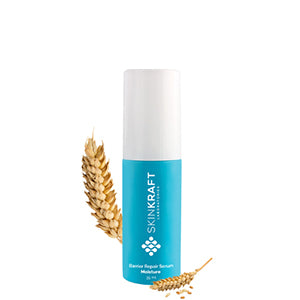One of our pregnant acquaintances was in for a shock when she suddenly noticed dark patches on her skin! Well, with all the hype about the famous pregnancy glow, she wasn’t expecting to see this during her pregnancy.
If you’re pregnant and are facing the same issue, you should know that it is a condition usually caused by fluctuating hormone levels. The fortunate part is that it can be treated with safe options and natural remedies. We tell you why prevention is half the cure in this case.
Highlights:
- Is Skin Discolouration Normal During Pregnancy?
- Why Does Skin Darken During Pregnancy?
- When Does Skin Discolouration Start During Pregnancy?
- Areas Where The Skin Darkens
- How To Get Rid Of Dark Skin During Pregnancy?
- Preventing Skin From Getting Dark During Pregnancy
- Does Your Skin Go Back To Normal After Pregnancy?
Is Skin Discolouration Normal During Pregnancy?
Melasma [1], also known as chloasma gravidarum [2], is fairly common during pregnancy. It may occur in 50.8% of pregnant women according to a study [3] in India. It is also referred to as the mask of pregnancy in informal terms. Melasma can also recur with the second or more pregnancies.
Why Does Skin Darken During Pregnancy?
- While there is no one cause of melasma, there can be several reasons behind its occurrence. One of them is the higher levels of hormones that are produced during pregnancy. These include oestrogen, progesterone and the ones that increase melanin production.
- Melasma is a condition where the skin’s cells, known as melanocytes [4] (melanin producing cells), get activated due to hormones. The amount of melanin produced increases, which makes the skin darker. It is the pigment that lends colour to our skin, eyes and hair.
- Melasma may be due to hereditary reasons. If your mother or aunts have had melasma, you are likely to have it.
- If you have had or still have hyperthyroidism [5], you may develop melasma.
- If you are exposed to the sun’s UV rays for long hours, you are also likely to get melasma.
When Does Skin Discolouration Start During Pregnancy?
In most cases, discolouration of the skin due to melasma appears in the first and second trimesters of pregnancy. However, it can start at any time during pregnancy. Timely precautionary measures are advised to avoid extreme darkening.
Note:
The only symptom that indicates melasma is the darkening of the skin during pregnancy. If your dark patches show other symptoms like itching, tenderness or pain when touched, you need to see your dermatologist.
Areas Where The Skin Darkens
Melasma usually occurs around the upper lip, chin, forehead and nose in a symmetrical manner. It shows up as patches of brown or grey brown skin like a mask. It can even happen in areas where the skin rubs against each other -- your underarms and your inner thighs.
These patches may also appear along the jawline and the arms -- areas that are exposed to sunlight. Already pigmented areas of your skin -- scars, freckles, nipples and your genital area might even become darker than normal during pregnancy.
Did You Know?
- Melasma occurs in all skin types, but more frequently among darker skinned women than fairer skinned ones.
- Women who come from North Africa, Latin America, the Middle East, India and other parts of Asia and the Mediterranean region are more likely to have melasma than their European Caucasian counterparts.
- Recent studies indicate that melasma may be chronic and lasts for many years for a majority of patients.
- Your skin is exposed to UV rays of the sun, even if you are seated near a window or in a car.
- Melasma can also be caused even due to hormone replacement therapy, or by taking birth control pills.
How To Get Rid Of Dark Skin During Pregnancy?
1. Seek Professional Treatment
Treatments involving chemicals are not considered safe during pregnancy and while breastfeeding. Your dermatologist may prescribe a topical ointment containing azelaic acid [6] or a chemical peel containing glycolic acid, which is considered safe.
2. Wear Sunscreen With High SPF
Use sunscreen even when you are indoors. Opt for a sunscreen that has a higher SPF, 30-50 or more. Look for ingredients that are safe for pregnant women to use, such as zinc oxide [7] and titanium dioxide [8], which are usually present in physical sunscreens. The product should be a broad spectrum one -- protecting against UVA and UVB rays.
3. Try Natural Remedies
There are several natural ingredients that you can use to lighten the darkened skin patches caused due to melasma. Some can be used on their own, while others need to be mixed to form a mask with different ingredients. These are all completely safe to use during pregnancy.
A. Lemon Juice
Lemon juice has astringent properties as it is acidic in nature and lightens the skin naturally. Squeeze juice from the lemons, dilute with little water and apply on the pigmented areas of the skin. Wash off after some time.
B. Turmeric
Make a paste of besan, milk and turmeric. The curcumin [9] present in turmeric can lighten the pigmented areas. Turmeric can also be mixed with rose water, coconut milk and lemon juice to make a skin-lightening mask.
C. Aloe Vera
Aloe vera is a gentle and effective way to lighten skin. All you need to do is cut a stem and extract the gel from the plant and directly apply it on the darkened skin. Leave on for 20 minutes and rinse off with warm water.
D. Oatmeal
Oatmeal is an excellent natural exfoliator. Apply a face pack with oatmeal mixed with honey and milk. Leave on till it dries up completely and then rinse off. It removes the dark brown spots and dead cells, giving you healthier, brighter skin.
E. Onion Juice
There are compounds present in onion juice that have sulphur, which can assist in removing darkened skin due to melasma. They also provide nourishment to the skin. Make a blend of onion juice and organic apple cider vinegar and apply on your skin.
F. Almonds
Whether eaten or applied on the skin, almonds are very good for skin health. They have proteins and vitamin E, which can reduce the signs of melasma. Make a paste of almonds, milk and honey and apply as a face pack. Rinse off after it dries.
G. Cucumber
This vegetable contains a high amount of water and is ideal to soothe skin that is pigmented. It can hydrate the skin while lightening the darkened skin patches.
H. Sandalwood
Sandalwood can be effective to lighten the skin that has darkened due to melasma during pregnancy. You can use it in powder or oil form. Make a pack with sandalwood powder and water to apply. It cools the skin, reduces acne and irritation.
I. Papaya
The enzyme present in papayas, known as papain [10] can work as a natural exfoliator. It lightens the skin and removes dead skin cells, making the skin lighter and brighter.
J. Potato
Potatoes contain Azelaic acid which is known to help reduce pigmentation [11] caused during pregnancy. All you need to do is grate a potato and apply the raw juice on the darkened skin patches. Once dry, rinse off with warm water.
K. Soya
Soy milk may be used to reduce skin darkened due to pregnancy. Soy contains fatty acids, isoflavones [12] and trypsin blockers [13] that can help reduce skin darkening due to pregnancy. Mix soy milk with tomato pulp and lemon juice. Apply on darkened areas, wash off when dry.
L. Orange Peel
Studies reveal that orange peel powder can be used to lighten the skin. Mix dried orange peel powder with honey and milk. Apply on the darkened areas and rinse off when dry.
M. Curds/Yogurt
Curds contain beneficial acids such as lactic acid, citric acid and glycolic acid which can help reduce the pigmentation in the skin. Make a mask with curds, honey and powdered oats and apply on the darkened areas of the skin. Rinse off when dry.
Preventing Skin From Getting Dark During Pregnancy
1. Stay Out Of The Sun
If you are pregnant or have already had melasma that is now absent due to treatment, it is vital to avoid the sun. That is because the condition can return due to exposure to the sun. Wear a hat, sunglasses and a scarf to cover your face and neck when you are out during the day.
2. Don’t Wax
When you wax your arms or facial areas such as the upper lip, it can cause irritation and skin inflammation. If you already have melasma, waxing can make it worse.
3. Don’t Bleach
Do not use skin bleach to lighten your skin during pregnancy. If you absolutely must cover the dark skin patches, you can use a concealer on those spots only.
4. Opt For Chemical-free Skincare Products
If you have darkened skin due to melasma, opt for products that are hypoallergenic or chemical free. This includes your cleansers and moisturisers. The chemicals in non-hypoallergenic products can irritate the skin and make the condition worse.
5. Maintain A Healthy Skincare Routine
To prevent skin darkening during pregnancy from getting worse, maintain a cleansing, toning and moisturising routine that includes wearing sunscreen. Even if you are indoors mostly, wear sunscreen. If you are stepping outdoors, apply it more frequently.
6. Consume Folic Acid
Ensure you have enough folate and folic acid in your diet either through foods such as spinach or through a supplement. The skin can darken during pregnancy due to a folate deficiency too.
7. Drink Water And Fresh Juice
Avoid all kinds of sugary, carbonated drinks and the juices available in supermarkets. If you want to control the melasma and prevent its appearance, it is best to drink lots of water and freshly made fruit and vegetable juices without any added sugars.
Does Your Skin Go Back To Normal After Pregnancy?
The skin doesn’t usually go back to normal on its own. It requires treatment for the dark patches to lighten completely after a pregnancy. In some cases, reversal of the skin to its normal condition may occur during the first year post the birthing.
Wrapping Up
Melasma is a condition that affects more than half the pregnant women. In some cases, skin darkening heals on its own post the birth. But, in other cases, it stays on and recurs with subsequent pregnancies. So, following all the above mentioned precautions and taking timely treatment is important.
1. https://www.aad.org/public/diseases/a-z/melasma-treatment
2. https://pubmed.ncbi.nlm.nih.gov/19140277/
3. https://www.ncbi.nlm.nih.gov/pmc/articles/PMC5574745/
4. https://www.ncbi.nlm.nih.gov/pmc/articles/PMC3834696/
5. https://www.niddk.nih.gov/health-information/endocrine-diseases/hyperthyroidism
6. https://medlineplus.gov/druginfo/meds/a603020.html
7. https://www.chemicalsafetyfacts.org/zinc-oxide/
8. https://www.chemicalsafetyfacts.org/titanium-dioxide/
9. https://www.ncbi.nlm.nih.gov/pmc/articles/PMC5664031/
10. https://link.springer.com/article/10.1023/A:1005670323912
11. http://www.plantsjournal.com/vol1Issue1/Issue_jan_2013/3.pdf
Recommended Products
Was this Article helpful?
- Least helpful
- Most helpful










